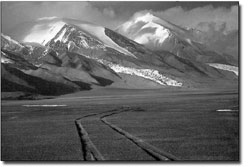|
|
||
|
Abbey screens ?Mountain Patrol: Kekexili? by Judith Reynolds rutal. Bleak. And beautiful. “Mountain Patrol: Kekexili” is an extraordinary Chinese film about a desperate situation in a remote place. There are lots of reasons to see it, and international festivals seem to agree. “Kekexili” won top awards in Berlin and Tokyo and was nominated for the grand jury prize at Sundance. Inspired by true events, the film was written and directed by Lu Chuan, head of China Film Group’s Creative Center. He’s taken on a strong subject: trafficking in endangered species. Lu’s story follows a volunteer patrol in pursuit of poachers. Each year in the Qinghai-Tibetan Plateau, hunters-for-profit kill thousands of Tibetan antelopes. The hides produce shahtoosh, a type of wool valued by the fashion industry. Given that premise, it’s enough to make the blood boil. And Lu’s triumph is that he doesn’t get preachy. He tells the story simply and strongly. Despite laws passed in the 1970s to prevent killing the antelope, the slaughter has gone on for decades. By the 1990s, the situation had become so dire that villagers organized patrols on their own to stop the poaching. You’ll see how desperate the task and how appalling the conditions. You’ll wonder at the human impulse to risk extreme hardship and life to protect animals. And you’ll wonder where on earth the government was in all this. A short, powerful prologue establishes the dangerous nature of the enterprise. Be prepared: It includes a cold murder and wholesale animal slaughter.
A short, powerful prologue establishes the dangerous nature of the enterprise. Be prepared: It includes a cold murder and wholesale animal slaughter. Once the tone and subject have been established, Lu tells the story of Ri Tai (Duo Bujie), a tough but decent patrol chief and his men. With great narrative economy, Lu brings in Ga Yu (Zhang Lei), a young, idealistic Beijing photojournalist who wants to travel with the patrol. Ga Yu joins the group, and an abrupt night departure propels the action forward. Ri Tai and his men track the bandits into Kekexili, the largest animal reserve in China. Traveling at extreme altitudes (over 3 miles high), their rusty jeeps look like insects speeding across barren, wind-swept ranges. They rumble high into the mountains, stopping at checkpoints to deliver supplies to solitary members of their cause. When they discover antelope carcasses, the men ritualistically collect, burn and honor the animals. And along the way, they encounter several threatening situations. In crafting this morality tale, Lu appears to draw upon the great tradition of the American Western. With its stark sense of good and evil, “Kekexili” follows a pursuit plot with a charismatic, humane leader and a colorful band of citizen-followers. When they meet the villains, it’s clear they deserve their reputation. Even the journalist, Ga Yu, is somewhat of a stock character. The grandeur of the landscape suggests it is the Asian counterpart to Monument Valley or the High Sierras. In terms of action and pacing, there are quiet stretches of breathtaking beauty inter rupted by explosive flashes of violence. At the end you learn that the volunteer patrols disbanded in 2001. The Chinese finally organized government patrols, but the practice of poaching persists and cries out for continued attention. •
|
In this week's issue...
- December 18, 2025
- Let it snow
Although ski areas across the West have taken a hit, there’s still hope
- December 18, 2025
- Look, but don't take
Lessons in pottery theft – and remorse – from SW Colorado
- December 11, 2025
- Big plans
Whole Foods, 270 apartments could be coming to Durango Mall parcel


